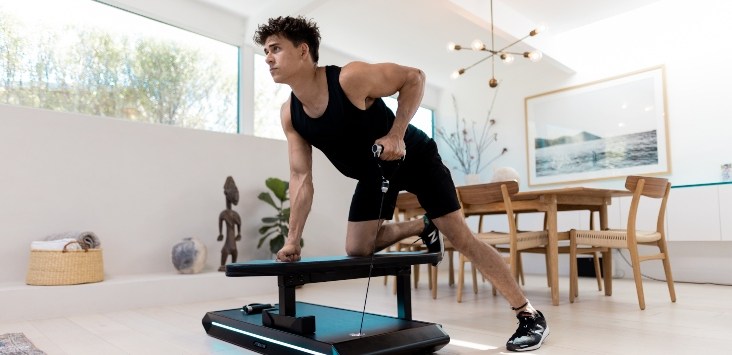
Trainer+ is an integrated fitness platform that comes with proprietary hardware, firmware and software built by Vitruvian. Source supplied.
Perth-based fitness startup Vitruvian has its sights set on gaining a stronger foothold in the North American market, after raising US$15 million ($21 million) in Series A funding last month.
Led by US-based investment funds, including Larsen Ventures and Ten13, this funding boost follows Vitruvian’s 2020 seed raise of $3.4 million, and a further seed raise of US$8 million ($11.2 million) in 2021.
Vitruvian’s product has already seen sales in over 20 countries, but the focus now, as founder and CEO Jon Gregory notes, is to scale production and grow the company.
“We will be focusing on materially growing the production volume of our product, while also growing our team from 40 to 60, and working on both marketing and distribution,” Gregory told SmartCompany.
Trainer+ is an integrated fitness platform that comes with proprietary hardware, firmware and software built by Vitruvian, which follows on the heels of the earlier model, the Vitruvian V-Form Trainer. Trainer+ acts as a “personal trainer in a box”, with the AI algorithm adapting workout routines to the user’s performance. It also comes with a monthly subscription that provides unlimited access to more exercises and performance insights.
Pandemic challenges
The global pandemic presented Vitruvian with both opportunities and challenges.
The idea — which came to Gregory in 2008, and which the former high frequency trader has been prototyping since — took 10 years to come together as a business. The pandemic was not far behind, with major lockdowns coinciding with Vitruvian’s launch of the V-Form Trainer in November 2020.

Vitruvian founder and CEO Jon Gregory. Source: supplied.
With COVID-19 forcing people to retreat to their homes, it created greater demand for home fitness equipment, and the second generation Trainer+ sold out within three months of its launch in November 2021.
“The pandemic has shown people it’s possible to exercise effectively at home. It’s created growing awareness for individual wellness, and opened up choices on how and where to train,” Gregory notes.
With growing awareness comes growing demand, but also growing challenges to meet this demand. In this, Vitruvian, like other companies, faces the specter of supply chain issues, but there’s also the slow move back to offices and the idea of returning to “normalcy”.
Gregory does not believe the post-pandemic world will slow down demand for the product.
“Our core mission is not to tell people how and where to train, but to meet them where they want to train with the most efficient, effective and convenient technology. We want to give them the best bang for buck wherever they do it, whether it’s in gyms or at home, with the best technology on offer.”
It does not hurt that the global connected fitness market is showing no signs of slowing. The consumer market alone was valued at over US$1 billion ($1.41 billion) in 2020 and is set to grow at 4.2% annually.
This does not count fitness centres and gyms, with the US market alone accounting for roughly a third of gym memberships worldwide.
With the demand for Trainer+ outstripping supply, Gregory adds: “It’s an onward march from here. It’s time to scale, make more products, build networks and run as fast as capital and global supply chains allow.”
Handpicked for you

How band-aids, duct tape and bolts can help your business grow



COMMENTS
SmartCompany is committed to hosting lively discussions. Help us keep the conversation useful, interesting and welcoming. We aim to publish comments quickly in the interest of promoting robust conversation, but we’re a small team and we deploy filters to protect against legal risk. Occasionally your comment may be held up while it is being reviewed, but we’re working as fast as we can to keep the conversation rolling.
The SmartCompany comment section is members-only content. Please subscribe to leave a comment.
The SmartCompany comment section is members-only content. Please login to leave a comment.